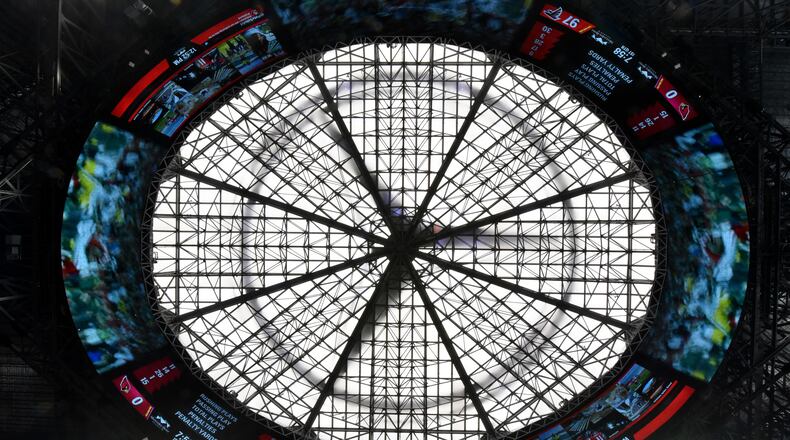During Atlanta United’s first training session at Mercedes-Benz Stadium recently, the noise from just 20,000 people made it difficult for the players to understand what manager Gerardo Martino wanted.
Those players were standing less than 10 yards away.
Sunday’s first game for the Five Stripes at Mercedes-Benz Stadium against Dallas sold out weeks ago. More than double that 20,000 to 42,500 people and that is the crowd expected for game day. The roof will be closed.
It’s going to be loud. Really loud. And the players can’t wait.
“You’d rather have that problem, honestly, versus playing in an empty stadium,” captain Michael Parkhurst said.
“Some guys on the field don’t want to hear what Tata is saying,” he added, laughing.
Falcons President and CEO Rich McKay said thought and scientific planning and engineering went into making sure that messages from the public-address system can be heard in Mercedes-Benz Stadium. Also considered was how loud fans can be inside the building.
Part of the scientific planning for noise included the materials used in the stadium’s roof, which uses a perforated metal deck with insulation. The perforations allow the sound to not immediately bounce, according to McKay.
Acoustic tiles can be installed to affect the noise. However, McKay said they wanted to experience and measure sound levels in a closed configuration before deciding if another step needs to be taken.
The first tests of the decibel levels may be during Sunday’s game, according to McKay.
“I have a sense it’s going to be pretty loud and that Atlanta United will be pretty happy,” he said.
While the resultant noise at Mercedes-Benz Stadium should provide an emotional lift for the players, with the exception of one in-game situation the players said they aren’t worried about hearing each other or the coaches.
Set-pieces seem a natural potential problem issue. The players said those will be worked on during training sessions.
“But everyone’s got to be tuned in,” midfielder Jeff Larentowicz said. “You can’t lose your head and not think about what you need to be doing because people aren’t going to be able to tell you very easily.”
Defending counter-attacks is where the noise from the crowd could be the biggest issue.
Dallas’ midfielders and forwards are very quick. Should Atlanta United turn over the ball, and Dallas breaks with the ball, Atlanta United’s players will need to tell each other who is picking up whom. Midfielder Julian Gressel agreed it will be similar to defending a fast break in basketball. MLS keeps track of fast breaks (not counter-attacks), and, according to its stats, Dallas is one of eight teams that have not scored a fast-break goal this season. Dallas has had six fast breaks, which is tied for eighth-most in the league.
“We will have to be really alert,” Larentowicz said.
Dealing with noise at home games isn’t a new issue for Atlanta United’s players.
Hector Villalba said it’s impossible to hear in Argentina’s stadiums where he, Miguel Almiron, Yamil Asad and Leandro Gonzalez Pirez played before they joined Atlanta United.
“Everyone’s concentration is going to be fundamental,” Villalba said.
Of course, there was also the atmosphere at Atlanta United’s previous home of Georgia Tech’s Bobby Dodd Stadium, which became among the loudest and best in MLS. The team leads the league in home attendance (46,318) through nine games.
Though attendance for six of the remaining eight home games will be capped at 42,500, the other two games will see Mercedes-Benz Stadium opened for full soccer capacity of 71,000. The first of the two will be Sept. 16 against Orlando City and the last will be against Toronto on Oct. 22.
Imagine the noise and resulting potential communication issues from either of those crowds, which would be the largest to see a game in MLS history, breaking the record of 69,255 set on April 13, 1996 in a game between the L.A. Galaxy and N.Y./N.J. MetroStars.
“There will be times when you are screaming as loud as you can and nothing’s happening,” Larentowicz said. “It’s something we will have to get used to.
“Bobby Dodd was very loud as well. We figured that out.”
About the Author
Keep Reading
The Latest
Featured


